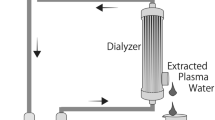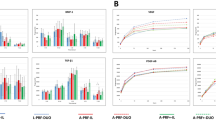Abstract
THE usual procedure for obtaining serum from clotted blood is to detach (rim) the clot from the collecting vessel, allow the clot to retract for several hours, and centrifuge at 500–1,000g. The procedure is not only time-consuming, but often results in much hæmolysis ; in addition the yields of serum vary greatly from sample to sample. By using stronger centrifugal force and thromboplastin, I have been able to obtain serum in high yields, within 1 h after bleeding, and with a minimum of hæmolysis.
This is a preview of subscription content, access via your institution
Access options
Subscribe to this journal
Receive 51 print issues and online access
$199.00 per year
only $3.90 per issue
Buy this article
- Purchase on Springer Link
- Instant access to full article PDF
Prices may be subject to local taxes which are calculated during checkout
Similar content being viewed by others
References
Hawk, P. B., Oser, B. L., and Summerson, W. H., Practical Physiological Chemistry, thirteenth ed., 490 (McGraw-Hill Book Co., New York, 1954).
Hirata, A. A., Amer. J. Vet. Res., 22, 158 (1961).
Budtz-Olsen, O. E., Clot Retraction (C. C. Thomas, Springfield, Illinois, 1951).
Author information
Authors and Affiliations
Rights and permissions
About this article
Cite this article
HIRATA, A. Increase of Yield of Serum from Samples of Blood. Nature 198, 96–97 (1963). https://doi.org/10.1038/198096b0
Issue Date:
DOI: https://doi.org/10.1038/198096b0
Comments
By submitting a comment you agree to abide by our Terms and Community Guidelines. If you find something abusive or that does not comply with our terms or guidelines please flag it as inappropriate.



